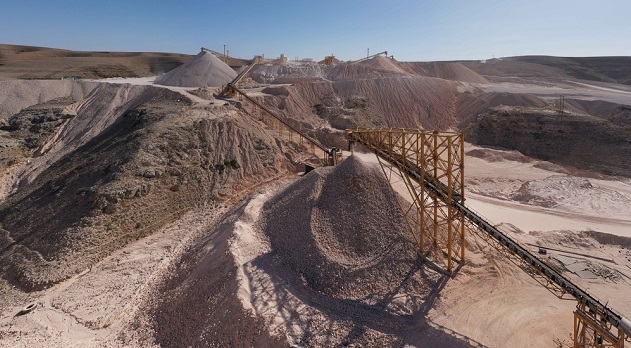
Muscat: The Ministry of Energy and Minerals has issued a decision to establish a national company in the Sultanate of Oman, named the "Oman Minerals Trading Company," to regulate the marketing and export of minerals and enhance in-country value (ICV) from natural resources.
This move is part of a comprehensive reform path to restructure mineral management and achieve integration between economic utilisation, environmental sustainability, and social responsibility.
The decision also regulates the export of gypsum and chrome ores, prioritising domestic market needs before considering export operations. Additionally, exported chrome ore must have a minimum concentration of 36%, while processed chrome may be exported at all concentrations subject to ministry approval. The decision aims to tighten oversight of marketing operations, strengthen Oman’s negotiating position in global markets, and enhance transparency in pricing Omani ores.
This move responds to structural challenges in the mineral market, including the proliferation of intermediaries and the lack of specialised marketing mechanisms, which have led to declining prices despite rising production volumes. Currently, there are 15 active gypsum mining licenses, with production reaching approximately 14 million tonnes in 2024, while 29 chrome mining licenses produced around 300,000 tonnes during the same period. These figures reflect the abundance of mineral resources and the need for a unified institutional framework to ensure optimal utilisation and marketing that maximises national returns.
The “Oman Minerals Trading Company”—a subsidiary of Minerals Development Oman (MDO)—will centrally manage exports, standardise contracts and specifications, and negotiate with international buyers under professional standards to raise average export prices and increase national revenues.
The new regulatory framework is expected to reduce price manipulation, improve logistics and export efficiency, enhance market transparency, and enable better government oversight of revenues. It will also boost local processing and employment opportunities, support small and medium enterprises (SMEs) in supply chains, and foster a business environment based on efficiency and integration.
This step aligns with the Ministry of Energy and Minerals' efforts to enhance ICV by requiring companies to adopt clear plans for increasing local content, localizing supply chains, and supporting downstream industries that add value to raw minerals before export. It falls under the "Majd" initiative launched by the ministry to consolidate and evaluate ICV efforts in the energy and minerals sector.
The ministry has granted a one-year transitional period for companies to conclude existing contracts and adapt to the new marketing mechanism. It also plans to organise awareness and training sessions for stakeholders while developing specialised cadres to manage sales and negotiations under the new framework.
Dr. Salah bin Hafeedh Al Dhahab, Director General of Investments at the Ministry of Energy and Minerals, stated that this decision marks a pivotal milestone in developing Oman’s mineral sector, reflecting the ministry’s commitment to optimising national resource management through export chain restructuring and the establishment of a dedicated national trading company.
He added that the decision addresses past market challenges, including lack of coordination, multiple intermediaries, and price fluctuations, which weakened the competitiveness of Omani products in some markets despite high production volumes and ore quality. The company will consolidate quantities, standardise specifications, and negotiate professionally with global markets, enhancing the marketing value of Omani products and delivering higher returns for both the government and investors. Prioritising domestic market access to ores before export is a strategic step to support downstream industries and stabilise industrial supply chains within Oman.
He noted that this decision is part of the institutional transformation led by the Ministry of Energy and Minerals since merging the energy and mining sectors. The ministry has developed policies, improved investment frameworks, and implemented unified governance systems, supported by national geological databases, ICV plans, and streamlined investor licensing in a transparent regulatory environment—all aligned with “Oman Vision 2040” goals to build a diversified, knowledge-driven economy based on optimal natural resource utilisation.
He expressed confidence that this regulation will foster a more reliable investment environment, support national enterprises, unlock viable industrial and commercial partnerships, enhance employment, and uphold occupational health, safety, and environmental (HSE) standards—positioning the mining sector as a vital contributor to the national economy.
Eng. Matar bin Salim Al Badi, CEO of Minerals Development Oman (MDO), stated that this mandate represents a strategic step to enhance supply chain efficiency, unify marketing efforts, and ensure price transparency and fairness—aligning with Oman’s aspirations to maximize economic returns from its natural resources.
He explained that the company is developing an integrated system covering registration procedures, purchase contracts, globally benchmarked pricing mechanisms, and logistics services to ensure supply reliability and shipping flexibility. Prioritising domestic market access and ensuring private sector readiness for the new model are key focuses.
He added that the company will launch a supplier and buyer registration programme starting in Q3 of 2025, ahead of the system’s official activation in May 2026. He emphasised early engagement with market stakeholders and invited producers, investors, and trade partners to explore collaboration opportunities under the new framework—whether in exports or industrial partnerships for local processing and promising investment prospects.
He affirmed that this approach represents a qualitative leap toward enabling Oman to maximise the mining sector’s potential and strengthen its competitive position in global markets.